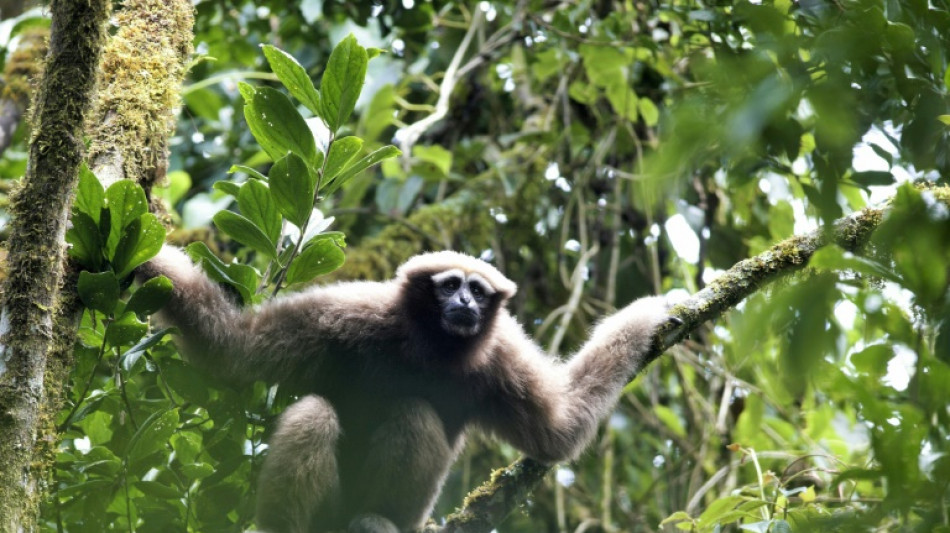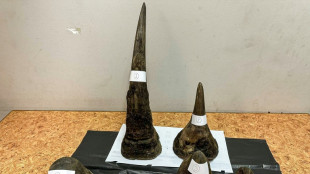
-
 AstraZeneca profit jumps as cancer drug sales grow
AstraZeneca profit jumps as cancer drug sales grow
-
Waseem's 66 enables UAE to post 173-6 against New Zealand

-
 Stocks mostly rise tracking tech, earnings
Stocks mostly rise tracking tech, earnings
-
Say cheese! 'Wallace & Gromit' expo puts kids into motion

-
 BP profits slide awaiting new CEO
BP profits slide awaiting new CEO
-
USA's Johnson sets up Shiffrin for tilt at Olympic combined gold

-
 Trump tariffs hurt French wine and spirits exports
Trump tariffs hurt French wine and spirits exports
-
Bangladesh police deploy to guard 'risky' polling centres

-
 OpenAI starts testing ads in ChatGPT
OpenAI starts testing ads in ChatGPT
-
Three-year heatwave bleached half the planet's coral reefs: study

-
 England's Buttler calls McCullum 'as sharp a coach as I ever worked with'
England's Buttler calls McCullum 'as sharp a coach as I ever worked with'
-
Israel PM to meet Trump with Iran missiles high on agenda

-
 Macron says wants 'European approach' in dialogue with Putin
Macron says wants 'European approach' in dialogue with Putin
-
Georgia waiting 'patiently' for US reset after Vance snub

-
 US singer leaves talent agency after CEO named in Epstein files
US singer leaves talent agency after CEO named in Epstein files
-
Skipper Marsh tells Australia to 'get the job done' at T20 World Cup

-
 South Korea avert boycott of Women's Asian Cup weeks before kickoff
South Korea avert boycott of Women's Asian Cup weeks before kickoff
-
Barcelona's unfinished basilica hits new heights despite delays

-
 Back to black: Philips posts first annual profit since 2021
Back to black: Philips posts first annual profit since 2021
-
South Korea police raid spy agency over drone flight into North

-
 'Good sense' hailed as blockbuster Pakistan-India match to go ahead
'Good sense' hailed as blockbuster Pakistan-India match to go ahead
-
Man arrested in Thailand for smuggling rhino horn inside meat

-
 Man City eye Premier League title twist as pressure mounts on Frank and Howe
Man City eye Premier League title twist as pressure mounts on Frank and Howe
-
South Korea police raid spy agency over drone flights into North

-
 Solar, wind capacity growth slowed last year, analysis shows
Solar, wind capacity growth slowed last year, analysis shows
-
'Family and intimacy under pressure' at Berlin film festival

-
 Basket-brawl as five ejected in Pistons-Hornets clash
Basket-brawl as five ejected in Pistons-Hornets clash
-
January was fifth hottest on record despite cold snap: EU monitor

-
 Asian markets extend gains as Tokyo enjoys another record day
Asian markets extend gains as Tokyo enjoys another record day
-
Warming climate threatens Greenland's ancestral way of life

-
 Japan election results confirm super-majority for Takaichi's party
Japan election results confirm super-majority for Takaichi's party
-
Unions rip American Airlines CEO on performance

-
 New York seeks rights for beloved but illegal 'bodega cats'
New York seeks rights for beloved but illegal 'bodega cats'
-
Blades of fury: Japan protests over 'rough' Olympic podium

-
 Zelensky defends Ukrainian athlete's helmet at Games after IOC ban
Zelensky defends Ukrainian athlete's helmet at Games after IOC ban
-
Jury told that Meta, Google 'engineered addiction' at landmark US trial

-
 Despite Trump, Bad Bunny reflects importance of Latinos in US politics
Despite Trump, Bad Bunny reflects importance of Latinos in US politics
-
KnowHow Teams Up with Rainbow Restoration to Strengthen Franchise Support with AI Knowledge Platform

-
 Voxpopme Introduces Compass: AI Agent That Transforms Customer Intelligence Into Strategic Impact
Voxpopme Introduces Compass: AI Agent That Transforms Customer Intelligence Into Strategic Impact
-
Best Dating Fraud Investigator in Sacramento

-
 Who Does Cheapest Breast Augmentation in Las Vegas?
Who Does Cheapest Breast Augmentation in Las Vegas?
-
Ryde Officially Recognises NPHVA to represent Platform Workers to Strengthen Representation and Long-Term Support for Driver-Partners

-
 What is Business Equipment Financing: New Equipment Financing Guide Released
What is Business Equipment Financing: New Equipment Financing Guide Released
-
Proxymity and FRT Collaborate to offer Class Action Services for Custody Banks and Sell-Side Firms

-
 Banyan Gold Strengthens Technical Team with Appointments of John Robins as Strategic Advisor and Key ESG Position
Banyan Gold Strengthens Technical Team with Appointments of John Robins as Strategic Advisor and Key ESG Position
-
Star Copper to Deploy Advanced Deep-Penetrating 3D IP to Expedite 2026 Drill Program

-
 Apex Mobilizes Second Drill Rig and Provides Phase I Update at the Rift Rare Earth Project in Nebraska, U.S.A.
Apex Mobilizes Second Drill Rig and Provides Phase I Update at the Rift Rare Earth Project in Nebraska, U.S.A.
-
Noram Fully Funded for 2026 and Engages GRE to Update PEA With Multiple High-Value Critical Mineral Byproduct Credits

-
 Gaming Realms PLC Announces FY25 Pre-Close Trading Update
Gaming Realms PLC Announces FY25 Pre-Close Trading Update
-
Caledonia Mining Corporation Plc - Issue of Securities Pursuant to Long Term Incentive Plan Awards


Finding Skywalker gibbons with love songs: study
Valentine's day is over but love's call lingers: the Skywalker gibbons' mating song, scientists reported this week, has revealed a previously unknown population -- the largest in the world -- of the endangered primate in the jungles of Myanmar.
When the Skywalker hoolock gibbon was first discovered in 2017 by a group of Star Wars-loving scientists, its only confirmed population -- less than 200 individuals -- was in neighbouring China's Yunnan Province.
But in a new study published in the International Journal of Primatology, researchers confirmed Myanmar has the largest known population of Skywalker gibbons in a single location.
"This is a significant discovery for the future of primate conservation in Myanmar," Ngwe Lwin, expedition leader and Fauna & Flora country director in Myanmar, said in a statement.
Gibbons do not swim, restricting them to the forest canopy's towering treetops.
This means broad rivers cutting through the jungle can dictate where the species settles.
Though no live Skywalker gibbons have been confirmed in Myanmar over the past century, a team of researchers from Myanmar, the United States, Britain and Germany followed a hunch based on geography that the primates might be found between two rivers in the southeast Asian nation.
Between December 2021 and March 2023, researchers set up acoustic monitoring systems in the hopes of detecting and recording the Skywalker's morning love songs to figure out their location.
Then, the team collected half-eaten plants and fruits favoured by the primates for genetic analysis.
When spotted, the researchers took photographs of Skywalker hoolock gibbons and compared them to other hoolock species, noting that Skywalkers have distinctively thinner eyebrows, a black or brown beard rather than a white one, and females have incomplete white face rings.
After determining viable habitat, analysing recordings and photographs, sequencing DNA and interviewing local wildlife and conservation organisations, the team had no doubts: Myanmar is home to 44 groups of Skywalker gibbons.
While the exact number of Skywalker gibbons in the new location is still unknown, a 2013 population estimate suggested that there could have been up to 65,000 gibbons in the area where Skywalkers were identified.
However, the current number of individuals could be lower due to the threats the primates face.
- Urgent need for protection -
Only four percent of habitat in Myanmar suitable for Skywalker gibbons is found in established protected areas.
Besides habitat loss, other threats the primates face include land fragmentation and degradation, accelerating deforestation, "bush meat" hunting, and the live trade in exotic animals.
More than 95 percent of the skywalker gibbon population in Myanmar exists outside of protected areas, and population decline is projected to continue, and possibly accelerate, according to the study.
Given these threats, the researchers recommended to the International Union for the Conservation of Nature (IUCN) that the species keep its "endangered" status despite the discovery of a new population.
"Now more than ever, it is recognised that the collective efforts of stakeholders, including governments, communities and Indigenous Peoples groups, are the only effective way to protect and save our closest living relatives," Ngwe Lwin said.
O.Karlsson--AMWN